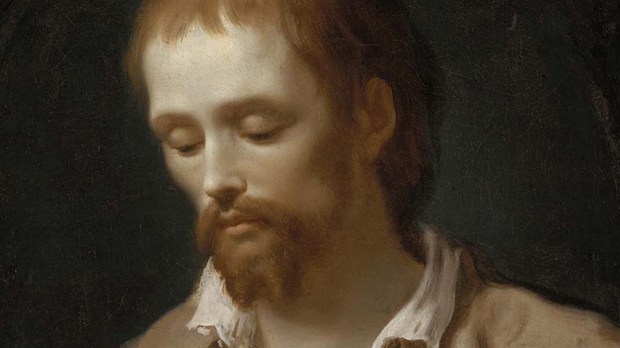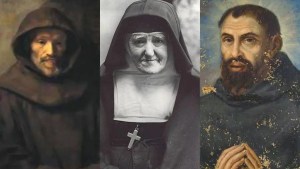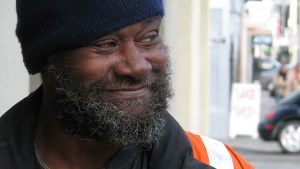On his 85th birthday in 2012, Benedict XVI noted a saint whose feast day is on his birthday (April 16), Benedict Joseph Labre. According to the pontiff, this saint is “one of the most unusual saints in the Church’s history.”
Here is his story:
Benedict Joseph Labre was born in the northern French province of Artois in 1748. His father, Jean-Baptiste Labre, was a prosperous shopkeeper. He and his wife, Anne Grandsire, had 15 children. Benedict was the oldest of them all.
Benedict had an uncle who was a parish priest. Although he lived quite a distance from the family home, his uncle agreed to take Benedict and begin his early education for him with the goal of Benedict becoming a priest.
When Benedict was 16, he asked his uncle if he could become a Trappist monk. He and his uncle approached his mom and dad about it, but they thought he was too young. They asked him to wait until he was older, and he honored their request. But things took an unexpected turn when a plague broke out in the city. His uncle immediately began taking care of the sick and dying, including many accumulating bodies. Benedict took charge of caring for the cattle, cleaning their stalls, and feeding them. Among the last to pass away was Benedict’s uncle. The priest had given all that he had.
Benedict set out for the Trappist Abbey in hopes of joining the Order. However, he was underage, too frail, and had no recommendations. The Carthusians and the Cistercians also rejected Benedict. He simply did not meet their rigid requirements. He did manage to gain admission to the Cisterian Abbey of Sep-fonts, but after six weeks, his health failed him, and he had to leave. He realized that his calling to serve was somewhere else.
The short time he spent in the monastery did help him realize his true vocation. He had come to understand that even though he felt called to the monastic life, he could not live that way. He was not like the others and could not live in a confined environment. He now understood that the outside world would be his cloister, and he would be the “loneliest of the lonely.” He would be a vagabond, God’s own poor man living on whatever others might give him. He would be a poor pilgrim serving God for the rest of his life. He was 25 years old.
Benedict Labre knew he had been called by God and was inspired by Alexius of Rome. He resolved to become a member of the Third Order of St. Francis. He was even determined to abandon his parents, siblings, country, and whatever else might provide contentment and pleasure in the world. Planning to lead a life of pain and penance, he would set out and devoutly visit sacred shrines of Christian devotion.
Benedict joined the Third Order of St. Francis and entered into a life of poverty and pilgrimage. He headed to Rome on foot, sustaining himself by begging. Losing weight and feeling weaker and weaker, Benedict still managed to visit most of the major shrines in Europe. He went to Loreto, Assisi, Naples, Paray-le-Monial in France, and Santiago de Compostela in Spain. He always traveled on foot and, most of the time, slept outdoors. On rare occasions, he was able to get the corner of a room to sleep in. Once, he stayed at the farmhouse of Matthieu and Mari Vianney, who would become the parents of the Cure d’ Ars.
Benedict was profoundly spiritual and would swoon when thinking of Jesus’ crown of thorns. He started to levitate and bilocate. He also began to cure some of the homeless people who were ill, and he reportedly multiplied bread. During his later years, he lived near the ruins of the Colosseum and would only leave once a year to make a pilgrimage to Loreto. He was so devoted to the Holy Eucharist that he became known as the “Saint of Forty-Hours.”
On April 15, 1783, Benedict collapsed in the Church of Santa Maria ai Morti. He wanted to be taken back to the Colosseum, but his friends took him to a place nearby. Benedict Joseph Labre died the next day, April 16. The cause of his death was malnutrition. He was 35 years old. It was Holy Week, and he was buried in the Church of Santa Maria ai Monti.
In St. Benedict Joseph’s biography, it is written that 136 cures were attributed to his intercession. These all occurred within three months of his death. These miracles also were the cause for the conversion of a first American Protestant clergyman to convert to Catholicism. His name was Reverend John Thayer and he was a resident of Rome at the time of Benedict’s death.
Benedict Joseph Labre was beatified by Pope Pius IX in 1860. He was canonized a saint by Pope Leo XIII in 1881. He is a patron saint of the mentally ill, the homeless, beggars, and bachelors.
St. Benedict Joseph Labre, please pray for us all.



